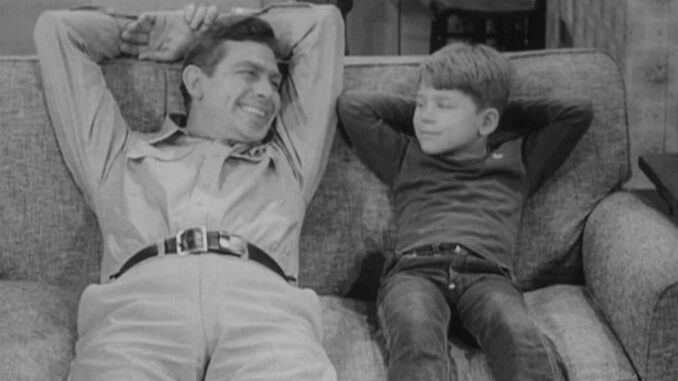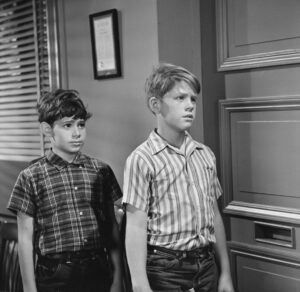
Introduction: The Price of Fame in Mayberry
When you think of The Andy Griffith Show, the words “wholesome,” “classic,” and “comforting” probably come to mind. The show gave us one of the most beloved TV towns of all time—Mayberry—and introduced us to characters who felt like family. At the center of it all? A sweet, red-haired boy named Opie Taylor, played by Ron Howard.
But behind the sunny days of fishing with Andy and walking down that dirt road was a darker reality for the young actor. Ron Howard, who would later become an acclaimed director, revealed that his early fame came at a cost—he was bullied by his peers for playing Opie. It’s a side of the story few fans ever saw.
Let’s dive into how childhood stardom became a double-edged sword for Ron Howard and how his experiences shaped his life and career beyond Mayberry.
The Rise of Opie Taylor: A Household Name at Just Six
The Audition That Changed Everything
Before he became Opie, Ron Howard was just a freckle-faced kid from Oklahoma with a big smile and a knack for acting. He auditioned for The Andy Griffith Show at just five years old and landed the part after charming producers with his natural talent.
Instant Fame in American Living Rooms
Once the show aired in 1960, Howard’s portrayal of Opie won over America. The father-son dynamic between Andy and Opie became the emotional core of the series. But while audiences adored the sweet boy on screen, not everyone in Ron’s real world shared the same admiration.
The Harsh Reality: Childhood Fame Comes With a Price
Bullied for Being on TV
Ron Howard admitted in later interviews that being famous didn’t exactly make him popular with his classmates. In fact, it did the opposite. He revealed, “I was a target. They teased me, called me ‘Dopey Opie’ and even accused me of thinking I was better than everyone else.”
Isolation at School
Kids didn’t treat Ron like a star—they treated him like an outsider. He recalled how classmates would mock his role, mimic his lines sarcastically, or just exclude him altogether. Ironically, the more beloved he became to the public, the more distanced he felt in his private life.

Why Kids Targeted Ron Howard
Jealousy and Misunderstanding
Let’s face it—kids can be cruel. Especially when they don’t understand something. Ron’s classmates likely didn’t grasp the long hours, hard work, and pressures he dealt with. All they saw was a kid on TV and assumed he had it easy.
Too Famous for His Own Good
Imagine trying to play kickball with friends while your face is on TV every week. For Ron, fame made blending in impossible. He wasn’t just “Ron”—he was Opie. And not everyone could separate the two.
Ron’s Family: A Strong Support System
Parents in the Industry
Thankfully, Ron wasn’t navigating this alone. His father, Rance Howard, was an actor, and his mother, Jean, had also worked in entertainment. They understood the demands of show business and did everything they could to keep Ron grounded.
Balancing Fame With Normalcy
Ron has often credited his parents with helping him maintain a sense of normalcy. They made sure he went to public school, did chores, and had responsibilities beyond the set. But even the strongest support can’t always stop the sting of bullying.
Ron’s Perspective as an Adult
No Bitterness—Just Reflection
Despite the teasing and hurtful experiences, Ron doesn’t seem to harbor resentment. In interviews, he reflects with maturity and insight, acknowledging that his fame made other kids uncomfortable. “They didn’t know what to make of it, and I didn’t know how to explain it,” he once said.
Lessons in Empathy
Rather than becoming bitter, Ron developed a deeper sense of empathy—something that shows in his later work as a director. Films like A Beautiful Mind and Cinderella Man showcase his talent for capturing emotional complexity.
The Legacy of Opie Taylor
Still One of TV’s Most Beloved Characters
Decades later, Opie Taylor remains one of television’s most iconic child characters. Viewers still adore him, and reruns of The Andy Griffith Show continue to introduce new generations to Mayberry.
A Character That Outgrew the Actor
For a time, Ron Howard was inseparable from the character. But as he transitioned into directing, he finally stepped out of Opie’s shadow and redefined his legacy.
Becoming a Director: Taking Back Control
From Actor to Filmmaker
Ron Howard’s transition from child star to Oscar-winning director wasn’t just a career shift—it was a transformation. Directing gave him the power to tell stories on his own terms, something he didn’t have as a young actor.
Fame on His Own Terms
With films like Apollo 13, The Da Vinci Code, and Frost/Nixon, Ron proved he was more than Opie. He wasn’t just a face from the past—he was a creative force in Hollywood.
The Double Life of Child Stars
A Familiar Story in Hollywood
Ron’s experience isn’t unique. Many child stars from classic TV have spoken out about the challenges of growing up under a spotlight. For every smiling face on screen, there’s often a child behind the scenes trying to figure out who they really are.
The Price of Early Stardom
Fame may bring fortune, but it can rob a child of simple joys—playgrounds, anonymity, and peer acceptance. Ron Howard’s story reminds us that being beloved by millions doesn’t always make you feel loved at home.
The Changing Landscape for Child Actors
More Awareness Today
Nowadays, Hollywood is more mindful of the challenges faced by child actors. Mental health, on-set education, and support systems are more robust. But back in the 1960s, Ron had to weather the storm with grit and parental support.
A Voice for the Next Generation
By sharing his own story, Ron has become a quiet advocate for kids in the industry—proving that you can come out the other side, not just surviving, but thriving.
Final Thoughts: Opie’s Real-Life Lessons
Ron Howard’s childhood might have looked picture-perfect on the screen, but real life wasn’t a walk in Mayberry. Behind that familiar whistle and those idyllic scenes was a young boy learning some very tough lessons about human nature, fame, and resilience.
And yet, Ron Howard didn’t just endure—he evolved. He took the pain, the mockery, and the pressure, and turned them into stories that touched the world in new ways.
That’s the mark of a true storyteller.
Conclusion
Ron Howard’s journey from Opie Taylor to one of Hollywood’s most respected directors is nothing short of remarkable. He took a role that once made him the subject of schoolyard ridicule and turned it into a foundation for an iconic career. His story is a reminder that fame is a double-edged sword—one that cuts deeper when you’re too young to understand it. But it also shows how resilience, family support, and creative passion can transform pain into power.
5 Unique FAQs
Q1: Why was Ron Howard bullied for playing Opie?
A: Ron was teased by classmates who saw his fame as something to mock or envy. Many kids didn’t understand acting and assumed he thought he was better than them.
Q2: How old was Ron Howard when he started on The Andy Griffith Show?
A: He was just 5 years old when he started playing Opie Taylor.
Q3: Did Ron Howard continue acting after The Andy Griffith Show?
A: Yes, he starred in Happy Days and other roles before moving into directing full-time.
Q4: How did Ron Howard deal with bullying?
A: He leaned on his family for support and eventually used his experiences as fuel for his storytelling career.
Q5: What is Ron Howard best known for today?
A: Today, Ron Howard is best known as an acclaimed film director with hits like A Beautiful Mind, Apollo 13, and The Da Vinci Code.
Would you like this article repurposed into a script or social media carousel next?